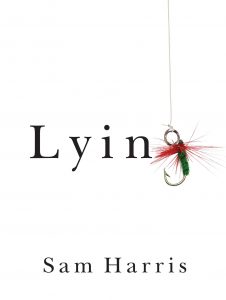This is a book summary of Lying by Sam Harris (Amazon).
Quick Housekeeping:
- All content in quotation marks is from the original author unless otherwise stated.
- I’ve added emphasis in bold for readability/skimmability.
Book Summary Contents: Click a link here to jump to a section below
- What is a lie?
- White Lies
- Trust
- Faint Praise
- Secrets
- Lies in Extremis
- Mental Accounting
- Integrity
- Big Lies
- Truthful Takeaways

Truthful Takeaways from Lying by Sam Harris (Book Summary)
What is a lie?
“It is in believing one thing while intending to communicate another that every lie is born.”
- “Lying is, almost by definition, a refusal to cooperate with others.”
- “To lie is to recoil from relationship.”
- “To lie is to intentionally mislead others when they expect honest communication.”
- “To lie is to erect a boundary between the truth we are living and the perception others have of us.”
- “People lie so that others will form beliefs that are not true. The more consequential the beliefs—that is, the more a person’s well-being demands a correct understanding of the world or of other people’s opinions—the more consequential the lie.”
- “When we presume to lie for the benefit of others, we have decided that we are the best judges of how much they should understand about their own lives—about how they appear, their reputations, or their prospects in the world.”
- “Most forms of private vice and public evil are kindled and sustained by lies.”
- “Lies are the social equivalent of toxic waste: Everyone is potentially harmed by their spread.”
- “Ethical transgressions are generally divided into two categories: the bad things we do (acts of commission) and the good things we fail to do (acts of omission). We tend to judge the former far more harshly.”
White Lies
“Lies we tell for the purpose of sparing others discomfort.”
- “Children do not learn to tell white lies until about the age of four, once they have achieved a hard-won awareness of the mental states of others.”
Trust
“Failures of personal integrity, once revealed, are rarely forgotten.”
- “We can apologize, of course. And we can resolve to be more forthright in the future. But we cannot erase the bad impression we have left in the minds of other people.”
Faint Praise
“We are often tempted to encourage others with insincere praise.”
- “In this we treat them like children—while failing to help them prepare for encounters with those who will judge them like adults.”
Secrets
“To agree to keep a secret is to assume a burden.”
- “A commitment to honesty does not necessarily require that we disclose facts about ourselves that we would prefer to keep private.”
Lies in Extremis
“A total prohibition against lying is ethically incoherent in anyone but a true pacifist.”
- “If you think that it can ever be appropriate to injure or kill a person in self-defense, or in defense of another, it makes no sense to rule out lying in the same circumstances.”
Mental Accounting
“One of the greatest problems for the liar is that he must keep track of his lies.”
- “Lies beget other lies.”
- “Lies must be continually protected from collisions with reality.”
- “The liar must remember what he said, and to whom, and must take care to maintain his falsehoods in the future. This can require an extraordinary amount of work—all of which comes at the expense of authentic communication and free attention.”
Integrity
“Integrity consists of many things, but it generally requires us to avoid behavior that readily leads to shame or remorse.”
- “To truly have integrity, we must not feel the need to lie about our personal lives.”
Big Lies
“Most of us are now painfully aware that our trust in government, corporations, and other public institutions has been undermined by lies.”
- “An unhappy fact about human psychology is probably at work here, which makes it hard to abolish lies once they have escaped into the world: We seem to be predisposed to remember statements as true even after they have been disconfirmed … In psychology, this is known as the ‘illusory truth effect.'”
Truthful Takeaways
“There are many reasons to believe that lying is precisely the sort of behavior we need to outgrow in order to build a better world.”
- “Among the many paradoxes of human life, this is perhaps the most peculiar and consequential: We often behave in ways that are guaranteed to make us unhappy.”
- “Nowhere do our injuries seem more casually self-inflicted, or the suffering we create more disproportionate to the needs of the moment, than in the lies we tell to other human beings.”
- “A willingness to be honest—especially about things that one might be expected to conceal—often leads to much more gratifying exchanges with other human beings.”
- “Honesty is a gift we can give to others. It is also a source of power and an engine of simplicity.”
- “The intent to communicate honestly is the measure of truthfulness.”
- “To speak truthfully is to accurately represent one’s beliefs.”
Questions to ask yourself:
- “How would your relationships change if you resolved never to lie again?”
- “What truths about yourself might suddenly come into view?”
- “What kind of person would you become?”
- “And how might you change the people around you? It is worth finding out.”
You May Also Enjoy:
- See all book summaries





